Entrepreneurship Report: Evaluating New Business Ideas and Stages
VerifiedAdded on 2020/10/22
|9
|2642
|279
Report
AI Summary
This report delves into the multifaceted world of entrepreneurship, beginning with a comprehensive introduction to the concepts of enterprise, entrepreneurship, and intrapreneurship. It meticulously outlines the essential skills, attributes, and behaviors of successful entrepreneurs, providing a clear understanding of the qualities that drive business success. The report emphasizes the critical importance of enterprise, entrepreneurship, and small businesses within the broader economic landscape, highlighting their contributions to innovation, job creation, and overall economic development. Furthermore, it details the crucial stages involved in evaluating new business ideas, from identifying target markets and conducting thorough market analyses to assessing market share and considering associated costs. The report concludes with a summary and recommendations, providing a holistic view of the entrepreneurial process and offering valuable insights for aspiring entrepreneurs. This report is a valuable resource for anyone seeking to understand and navigate the complexities of the business world.

ENTREPRENEURSHIP
REPORT
REPORT
Paraphrase This Document
Need a fresh take? Get an instant paraphrase of this document with our AI Paraphraser
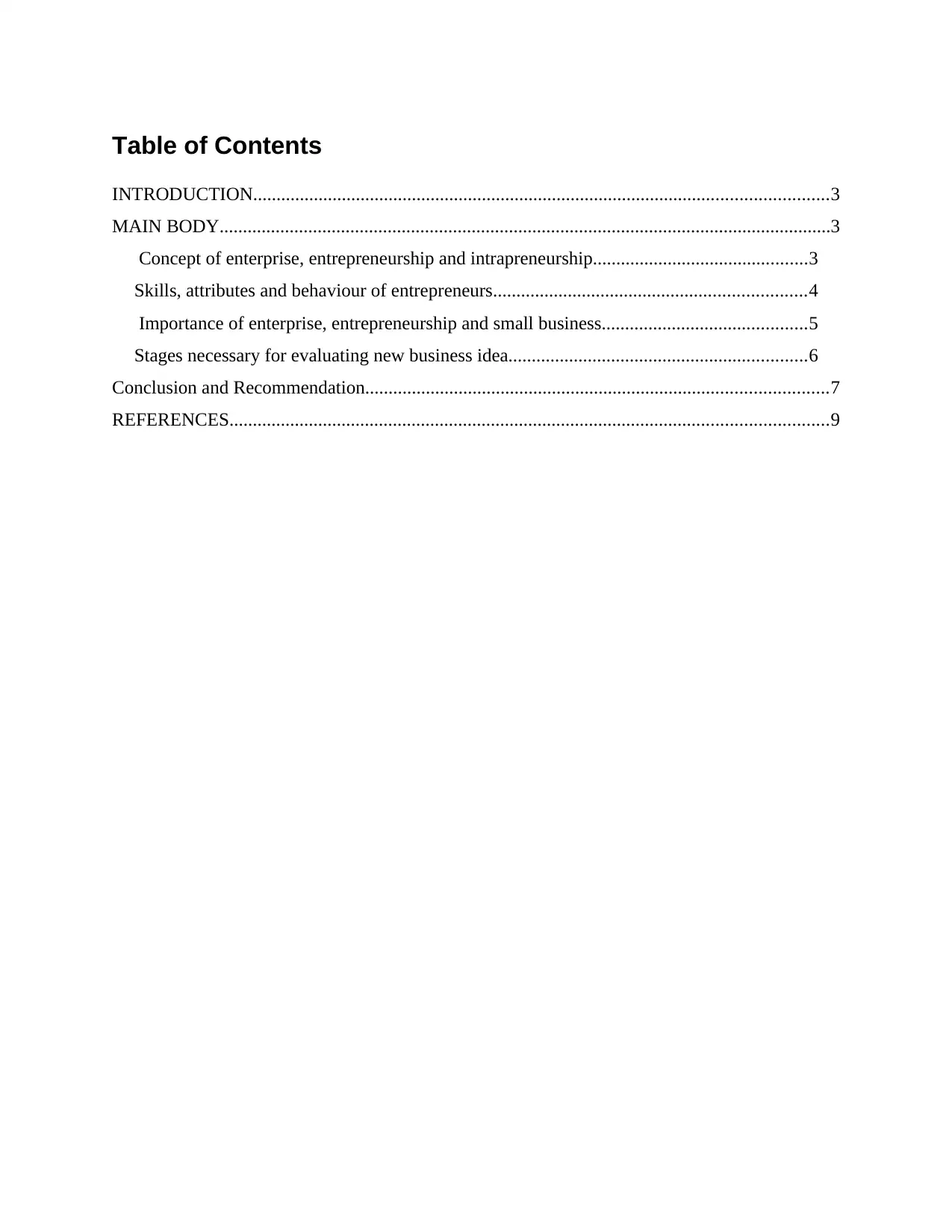
Table of Contents
INTRODUCTION...........................................................................................................................3
MAIN BODY...................................................................................................................................3
Concept of enterprise, entrepreneurship and intrapreneurship..............................................3
Skills, attributes and behaviour of entrepreneurs...................................................................4
Importance of enterprise, entrepreneurship and small business............................................5
Stages necessary for evaluating new business idea................................................................6
Conclusion and Recommendation...................................................................................................7
REFERENCES................................................................................................................................9
INTRODUCTION...........................................................................................................................3
MAIN BODY...................................................................................................................................3
Concept of enterprise, entrepreneurship and intrapreneurship..............................................3
Skills, attributes and behaviour of entrepreneurs...................................................................4
Importance of enterprise, entrepreneurship and small business............................................5
Stages necessary for evaluating new business idea................................................................6
Conclusion and Recommendation...................................................................................................7
REFERENCES................................................................................................................................9
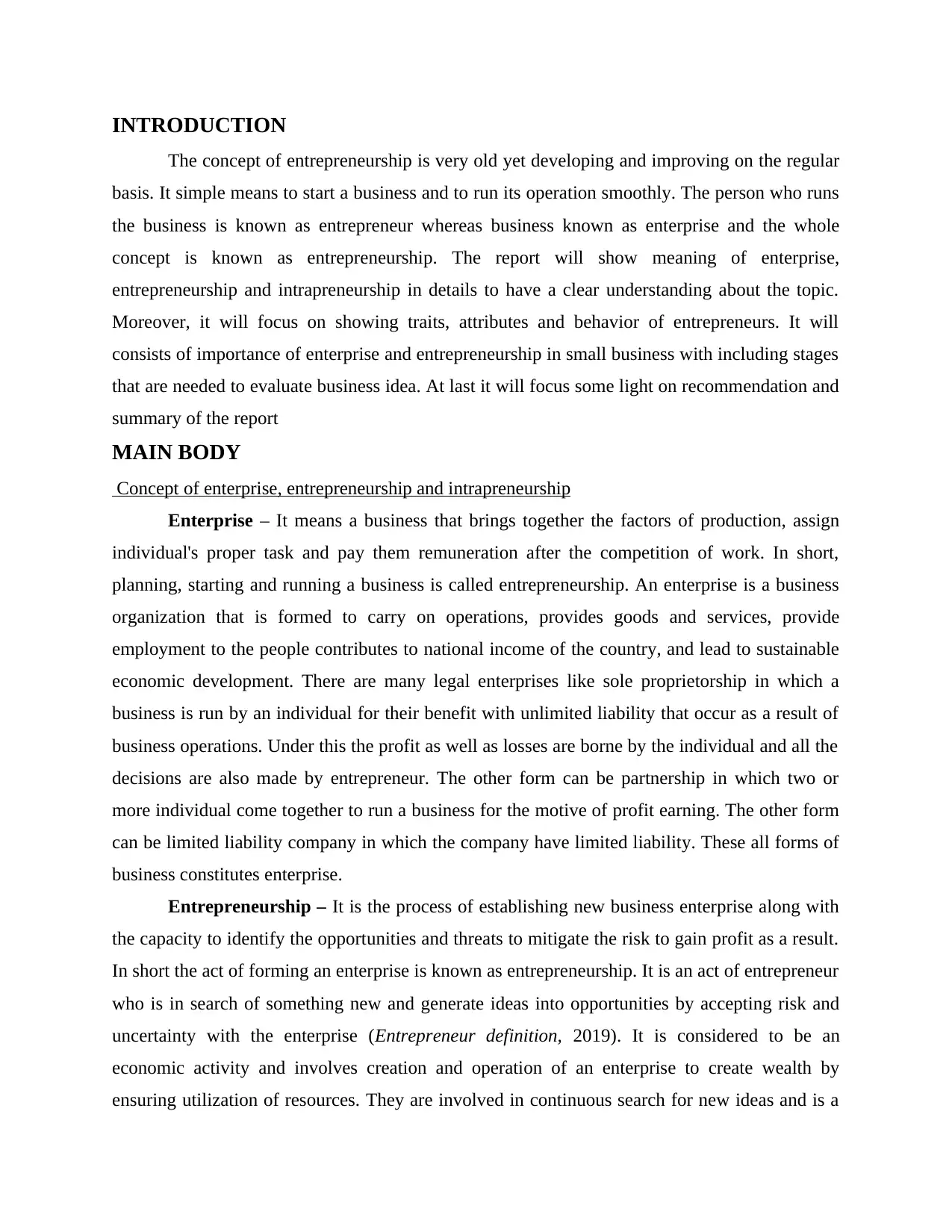
INTRODUCTION
The concept of entrepreneurship is very old yet developing and improving on the regular
basis. It simple means to start a business and to run its operation smoothly. The person who runs
the business is known as entrepreneur whereas business known as enterprise and the whole
concept is known as entrepreneurship. The report will show meaning of enterprise,
entrepreneurship and intrapreneurship in details to have a clear understanding about the topic.
Moreover, it will focus on showing traits, attributes and behavior of entrepreneurs. It will
consists of importance of enterprise and entrepreneurship in small business with including stages
that are needed to evaluate business idea. At last it will focus some light on recommendation and
summary of the report
MAIN BODY
Concept of enterprise, entrepreneurship and intrapreneurship
Enterprise – It means a business that brings together the factors of production, assign
individual's proper task and pay them remuneration after the competition of work. In short,
planning, starting and running a business is called entrepreneurship. An enterprise is a business
organization that is formed to carry on operations, provides goods and services, provide
employment to the people contributes to national income of the country, and lead to sustainable
economic development. There are many legal enterprises like sole proprietorship in which a
business is run by an individual for their benefit with unlimited liability that occur as a result of
business operations. Under this the profit as well as losses are borne by the individual and all the
decisions are also made by entrepreneur. The other form can be partnership in which two or
more individual come together to run a business for the motive of profit earning. The other form
can be limited liability company in which the company have limited liability. These all forms of
business constitutes enterprise.
Entrepreneurship – It is the process of establishing new business enterprise along with
the capacity to identify the opportunities and threats to mitigate the risk to gain profit as a result.
In short the act of forming an enterprise is known as entrepreneurship. It is an act of entrepreneur
who is in search of something new and generate ideas into opportunities by accepting risk and
uncertainty with the enterprise (Entrepreneur definition, 2019). It is considered to be an
economic activity and involves creation and operation of an enterprise to create wealth by
ensuring utilization of resources. They are involved in continuous search for new ideas and is a
The concept of entrepreneurship is very old yet developing and improving on the regular
basis. It simple means to start a business and to run its operation smoothly. The person who runs
the business is known as entrepreneur whereas business known as enterprise and the whole
concept is known as entrepreneurship. The report will show meaning of enterprise,
entrepreneurship and intrapreneurship in details to have a clear understanding about the topic.
Moreover, it will focus on showing traits, attributes and behavior of entrepreneurs. It will
consists of importance of enterprise and entrepreneurship in small business with including stages
that are needed to evaluate business idea. At last it will focus some light on recommendation and
summary of the report
MAIN BODY
Concept of enterprise, entrepreneurship and intrapreneurship
Enterprise – It means a business that brings together the factors of production, assign
individual's proper task and pay them remuneration after the competition of work. In short,
planning, starting and running a business is called entrepreneurship. An enterprise is a business
organization that is formed to carry on operations, provides goods and services, provide
employment to the people contributes to national income of the country, and lead to sustainable
economic development. There are many legal enterprises like sole proprietorship in which a
business is run by an individual for their benefit with unlimited liability that occur as a result of
business operations. Under this the profit as well as losses are borne by the individual and all the
decisions are also made by entrepreneur. The other form can be partnership in which two or
more individual come together to run a business for the motive of profit earning. The other form
can be limited liability company in which the company have limited liability. These all forms of
business constitutes enterprise.
Entrepreneurship – It is the process of establishing new business enterprise along with
the capacity to identify the opportunities and threats to mitigate the risk to gain profit as a result.
In short the act of forming an enterprise is known as entrepreneurship. It is an act of entrepreneur
who is in search of something new and generate ideas into opportunities by accepting risk and
uncertainty with the enterprise (Entrepreneur definition, 2019). It is considered to be an
economic activity and involves creation and operation of an enterprise to create wealth by
ensuring utilization of resources. They are involved in continuous search for new ideas and is a
⊘ This is a preview!⊘
Do you want full access?
Subscribe today to unlock all pages.

Trusted by 1+ million students worldwide
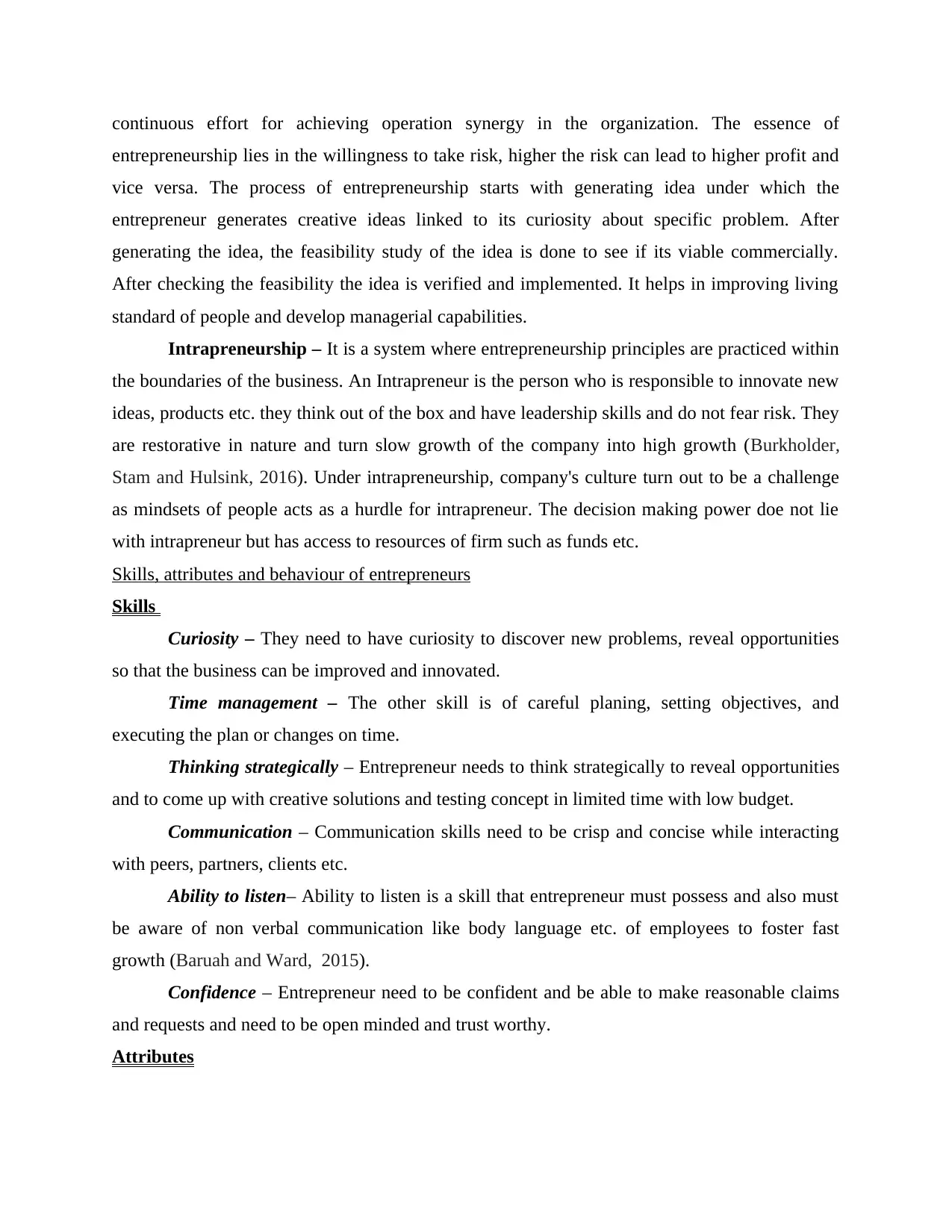
continuous effort for achieving operation synergy in the organization. The essence of
entrepreneurship lies in the willingness to take risk, higher the risk can lead to higher profit and
vice versa. The process of entrepreneurship starts with generating idea under which the
entrepreneur generates creative ideas linked to its curiosity about specific problem. After
generating the idea, the feasibility study of the idea is done to see if its viable commercially.
After checking the feasibility the idea is verified and implemented. It helps in improving living
standard of people and develop managerial capabilities.
Intrapreneurship – It is a system where entrepreneurship principles are practiced within
the boundaries of the business. An Intrapreneur is the person who is responsible to innovate new
ideas, products etc. they think out of the box and have leadership skills and do not fear risk. They
are restorative in nature and turn slow growth of the company into high growth (Burkholder,
Stam and Hulsink, 2016). Under intrapreneurship, company's culture turn out to be a challenge
as mindsets of people acts as a hurdle for intrapreneur. The decision making power doe not lie
with intrapreneur but has access to resources of firm such as funds etc.
Skills, attributes and behaviour of entrepreneurs
Skills
Curiosity – They need to have curiosity to discover new problems, reveal opportunities
so that the business can be improved and innovated.
Time management – The other skill is of careful planing, setting objectives, and
executing the plan or changes on time.
Thinking strategically – Entrepreneur needs to think strategically to reveal opportunities
and to come up with creative solutions and testing concept in limited time with low budget.
Communication – Communication skills need to be crisp and concise while interacting
with peers, partners, clients etc.
Ability to listen– Ability to listen is a skill that entrepreneur must possess and also must
be aware of non verbal communication like body language etc. of employees to foster fast
growth (Baruah and Ward, 2015).
Confidence – Entrepreneur need to be confident and be able to make reasonable claims
and requests and need to be open minded and trust worthy.
Attributes
entrepreneurship lies in the willingness to take risk, higher the risk can lead to higher profit and
vice versa. The process of entrepreneurship starts with generating idea under which the
entrepreneur generates creative ideas linked to its curiosity about specific problem. After
generating the idea, the feasibility study of the idea is done to see if its viable commercially.
After checking the feasibility the idea is verified and implemented. It helps in improving living
standard of people and develop managerial capabilities.
Intrapreneurship – It is a system where entrepreneurship principles are practiced within
the boundaries of the business. An Intrapreneur is the person who is responsible to innovate new
ideas, products etc. they think out of the box and have leadership skills and do not fear risk. They
are restorative in nature and turn slow growth of the company into high growth (Burkholder,
Stam and Hulsink, 2016). Under intrapreneurship, company's culture turn out to be a challenge
as mindsets of people acts as a hurdle for intrapreneur. The decision making power doe not lie
with intrapreneur but has access to resources of firm such as funds etc.
Skills, attributes and behaviour of entrepreneurs
Skills
Curiosity – They need to have curiosity to discover new problems, reveal opportunities
so that the business can be improved and innovated.
Time management – The other skill is of careful planing, setting objectives, and
executing the plan or changes on time.
Thinking strategically – Entrepreneur needs to think strategically to reveal opportunities
and to come up with creative solutions and testing concept in limited time with low budget.
Communication – Communication skills need to be crisp and concise while interacting
with peers, partners, clients etc.
Ability to listen– Ability to listen is a skill that entrepreneur must possess and also must
be aware of non verbal communication like body language etc. of employees to foster fast
growth (Baruah and Ward, 2015).
Confidence – Entrepreneur need to be confident and be able to make reasonable claims
and requests and need to be open minded and trust worthy.
Attributes
Paraphrase This Document
Need a fresh take? Get an instant paraphrase of this document with our AI Paraphraser
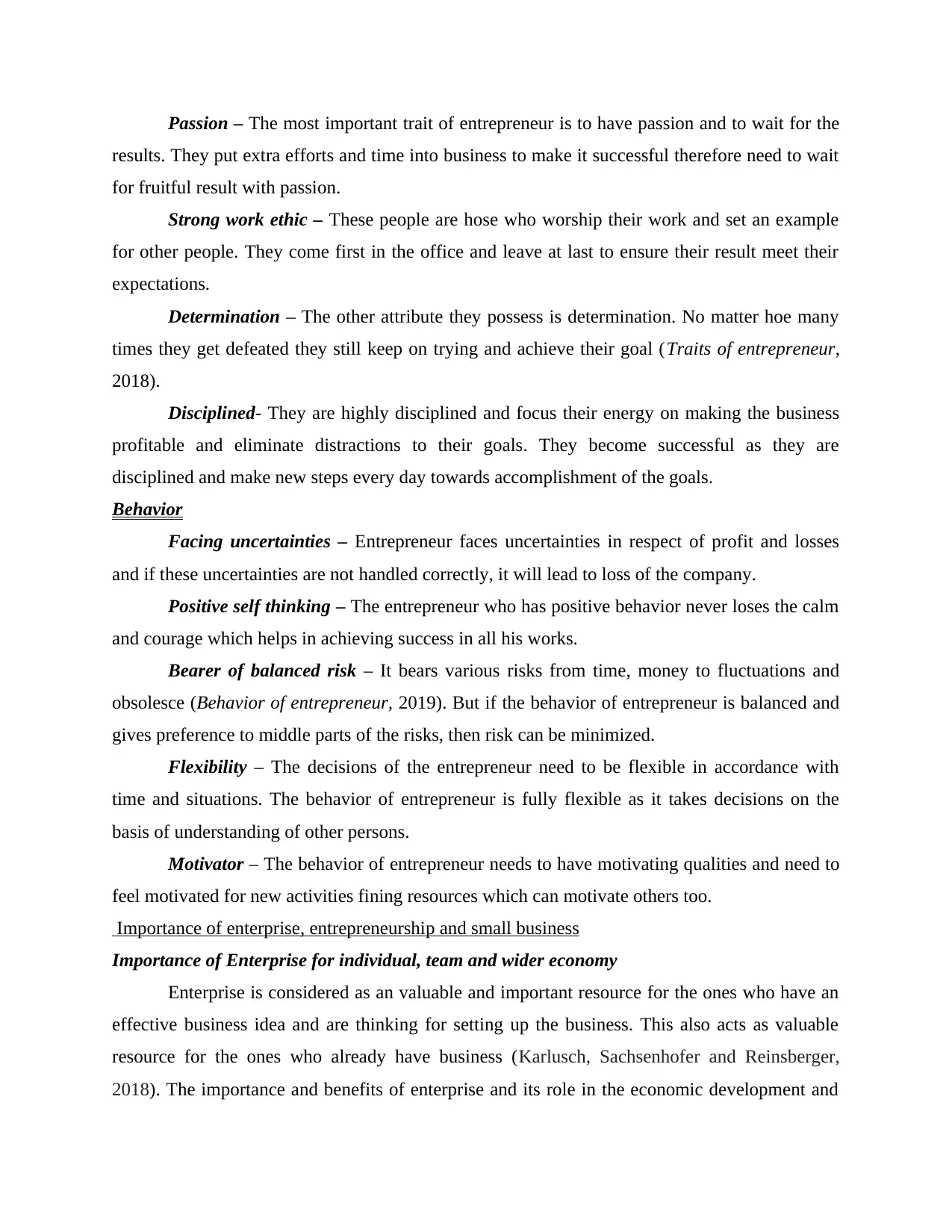
Passion – The most important trait of entrepreneur is to have passion and to wait for the
results. They put extra efforts and time into business to make it successful therefore need to wait
for fruitful result with passion.
Strong work ethic – These people are hose who worship their work and set an example
for other people. They come first in the office and leave at last to ensure their result meet their
expectations.
Determination – The other attribute they possess is determination. No matter hoe many
times they get defeated they still keep on trying and achieve their goal (Traits of entrepreneur,
2018).
Disciplined- They are highly disciplined and focus their energy on making the business
profitable and eliminate distractions to their goals. They become successful as they are
disciplined and make new steps every day towards accomplishment of the goals.
Behavior
Facing uncertainties – Entrepreneur faces uncertainties in respect of profit and losses
and if these uncertainties are not handled correctly, it will lead to loss of the company.
Positive self thinking – The entrepreneur who has positive behavior never loses the calm
and courage which helps in achieving success in all his works.
Bearer of balanced risk – It bears various risks from time, money to fluctuations and
obsolesce (Behavior of entrepreneur, 2019). But if the behavior of entrepreneur is balanced and
gives preference to middle parts of the risks, then risk can be minimized.
Flexibility – The decisions of the entrepreneur need to be flexible in accordance with
time and situations. The behavior of entrepreneur is fully flexible as it takes decisions on the
basis of understanding of other persons.
Motivator – The behavior of entrepreneur needs to have motivating qualities and need to
feel motivated for new activities fining resources which can motivate others too.
Importance of enterprise, entrepreneurship and small business
Importance of Enterprise for individual, team and wider economy
Enterprise is considered as an valuable and important resource for the ones who have an
effective business idea and are thinking for setting up the business. This also acts as valuable
resource for the ones who already have business (Karlusch, Sachsenhofer and Reinsberger,
2018). The importance and benefits of enterprise and its role in the economic development and
results. They put extra efforts and time into business to make it successful therefore need to wait
for fruitful result with passion.
Strong work ethic – These people are hose who worship their work and set an example
for other people. They come first in the office and leave at last to ensure their result meet their
expectations.
Determination – The other attribute they possess is determination. No matter hoe many
times they get defeated they still keep on trying and achieve their goal (Traits of entrepreneur,
2018).
Disciplined- They are highly disciplined and focus their energy on making the business
profitable and eliminate distractions to their goals. They become successful as they are
disciplined and make new steps every day towards accomplishment of the goals.
Behavior
Facing uncertainties – Entrepreneur faces uncertainties in respect of profit and losses
and if these uncertainties are not handled correctly, it will lead to loss of the company.
Positive self thinking – The entrepreneur who has positive behavior never loses the calm
and courage which helps in achieving success in all his works.
Bearer of balanced risk – It bears various risks from time, money to fluctuations and
obsolesce (Behavior of entrepreneur, 2019). But if the behavior of entrepreneur is balanced and
gives preference to middle parts of the risks, then risk can be minimized.
Flexibility – The decisions of the entrepreneur need to be flexible in accordance with
time and situations. The behavior of entrepreneur is fully flexible as it takes decisions on the
basis of understanding of other persons.
Motivator – The behavior of entrepreneur needs to have motivating qualities and need to
feel motivated for new activities fining resources which can motivate others too.
Importance of enterprise, entrepreneurship and small business
Importance of Enterprise for individual, team and wider economy
Enterprise is considered as an valuable and important resource for the ones who have an
effective business idea and are thinking for setting up the business. This also acts as valuable
resource for the ones who already have business (Karlusch, Sachsenhofer and Reinsberger,
2018). The importance and benefits of enterprise and its role in the economic development and
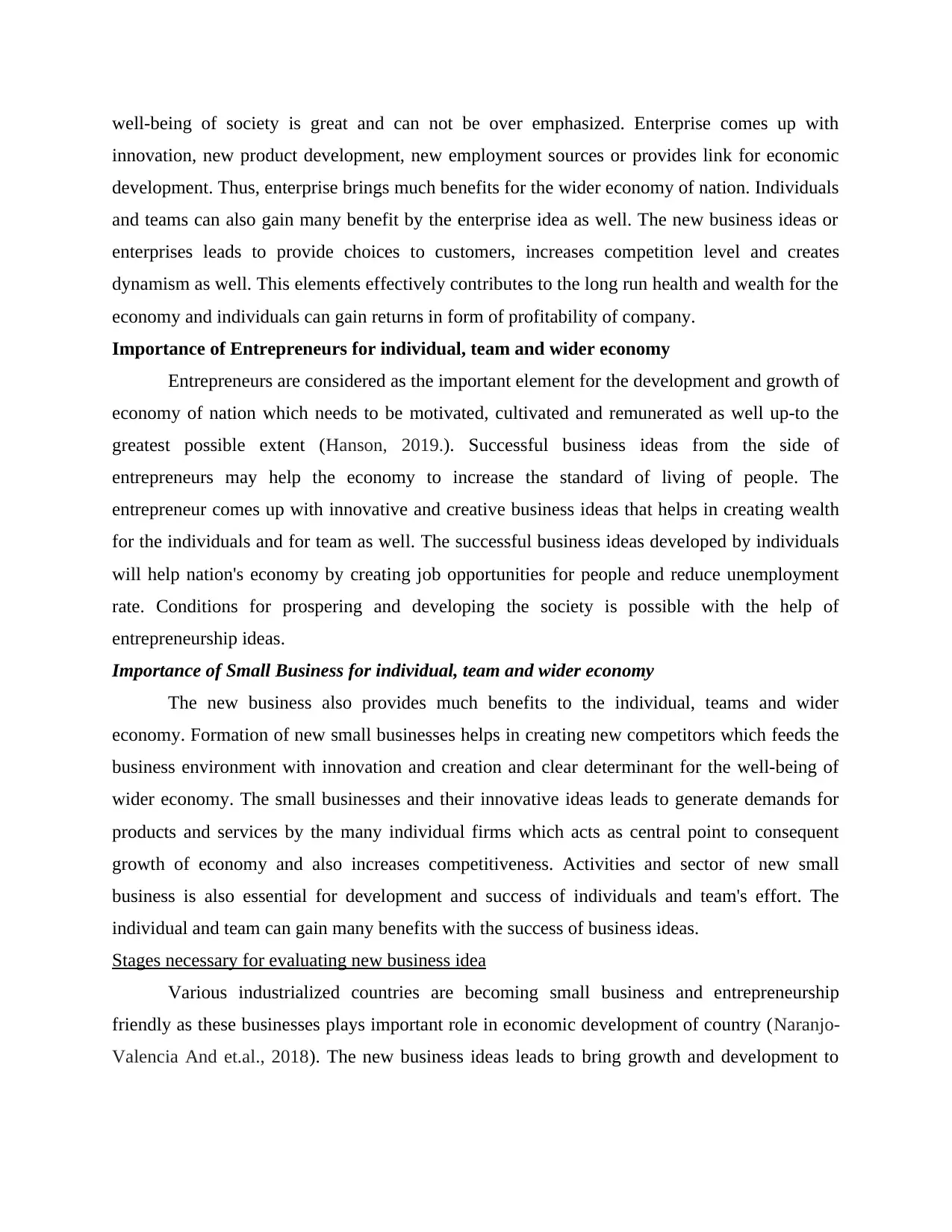
well-being of society is great and can not be over emphasized. Enterprise comes up with
innovation, new product development, new employment sources or provides link for economic
development. Thus, enterprise brings much benefits for the wider economy of nation. Individuals
and teams can also gain many benefit by the enterprise idea as well. The new business ideas or
enterprises leads to provide choices to customers, increases competition level and creates
dynamism as well. This elements effectively contributes to the long run health and wealth for the
economy and individuals can gain returns in form of profitability of company.
Importance of Entrepreneurs for individual, team and wider economy
Entrepreneurs are considered as the important element for the development and growth of
economy of nation which needs to be motivated, cultivated and remunerated as well up-to the
greatest possible extent (Hanson, 2019.). Successful business ideas from the side of
entrepreneurs may help the economy to increase the standard of living of people. The
entrepreneur comes up with innovative and creative business ideas that helps in creating wealth
for the individuals and for team as well. The successful business ideas developed by individuals
will help nation's economy by creating job opportunities for people and reduce unemployment
rate. Conditions for prospering and developing the society is possible with the help of
entrepreneurship ideas.
Importance of Small Business for individual, team and wider economy
The new business also provides much benefits to the individual, teams and wider
economy. Formation of new small businesses helps in creating new competitors which feeds the
business environment with innovation and creation and clear determinant for the well-being of
wider economy. The small businesses and their innovative ideas leads to generate demands for
products and services by the many individual firms which acts as central point to consequent
growth of economy and also increases competitiveness. Activities and sector of new small
business is also essential for development and success of individuals and team's effort. The
individual and team can gain many benefits with the success of business ideas.
Stages necessary for evaluating new business idea
Various industrialized countries are becoming small business and entrepreneurship
friendly as these businesses plays important role in economic development of country (Naranjo-
Valencia And et.al., 2018). The new business ideas leads to bring growth and development to
innovation, new product development, new employment sources or provides link for economic
development. Thus, enterprise brings much benefits for the wider economy of nation. Individuals
and teams can also gain many benefit by the enterprise idea as well. The new business ideas or
enterprises leads to provide choices to customers, increases competition level and creates
dynamism as well. This elements effectively contributes to the long run health and wealth for the
economy and individuals can gain returns in form of profitability of company.
Importance of Entrepreneurs for individual, team and wider economy
Entrepreneurs are considered as the important element for the development and growth of
economy of nation which needs to be motivated, cultivated and remunerated as well up-to the
greatest possible extent (Hanson, 2019.). Successful business ideas from the side of
entrepreneurs may help the economy to increase the standard of living of people. The
entrepreneur comes up with innovative and creative business ideas that helps in creating wealth
for the individuals and for team as well. The successful business ideas developed by individuals
will help nation's economy by creating job opportunities for people and reduce unemployment
rate. Conditions for prospering and developing the society is possible with the help of
entrepreneurship ideas.
Importance of Small Business for individual, team and wider economy
The new business also provides much benefits to the individual, teams and wider
economy. Formation of new small businesses helps in creating new competitors which feeds the
business environment with innovation and creation and clear determinant for the well-being of
wider economy. The small businesses and their innovative ideas leads to generate demands for
products and services by the many individual firms which acts as central point to consequent
growth of economy and also increases competitiveness. Activities and sector of new small
business is also essential for development and success of individuals and team's effort. The
individual and team can gain many benefits with the success of business ideas.
Stages necessary for evaluating new business idea
Various industrialized countries are becoming small business and entrepreneurship
friendly as these businesses plays important role in economic development of country (Naranjo-
Valencia And et.al., 2018). The new business ideas leads to bring growth and development to
⊘ This is a preview!⊘
Do you want full access?
Subscribe today to unlock all pages.

Trusted by 1+ million students worldwide
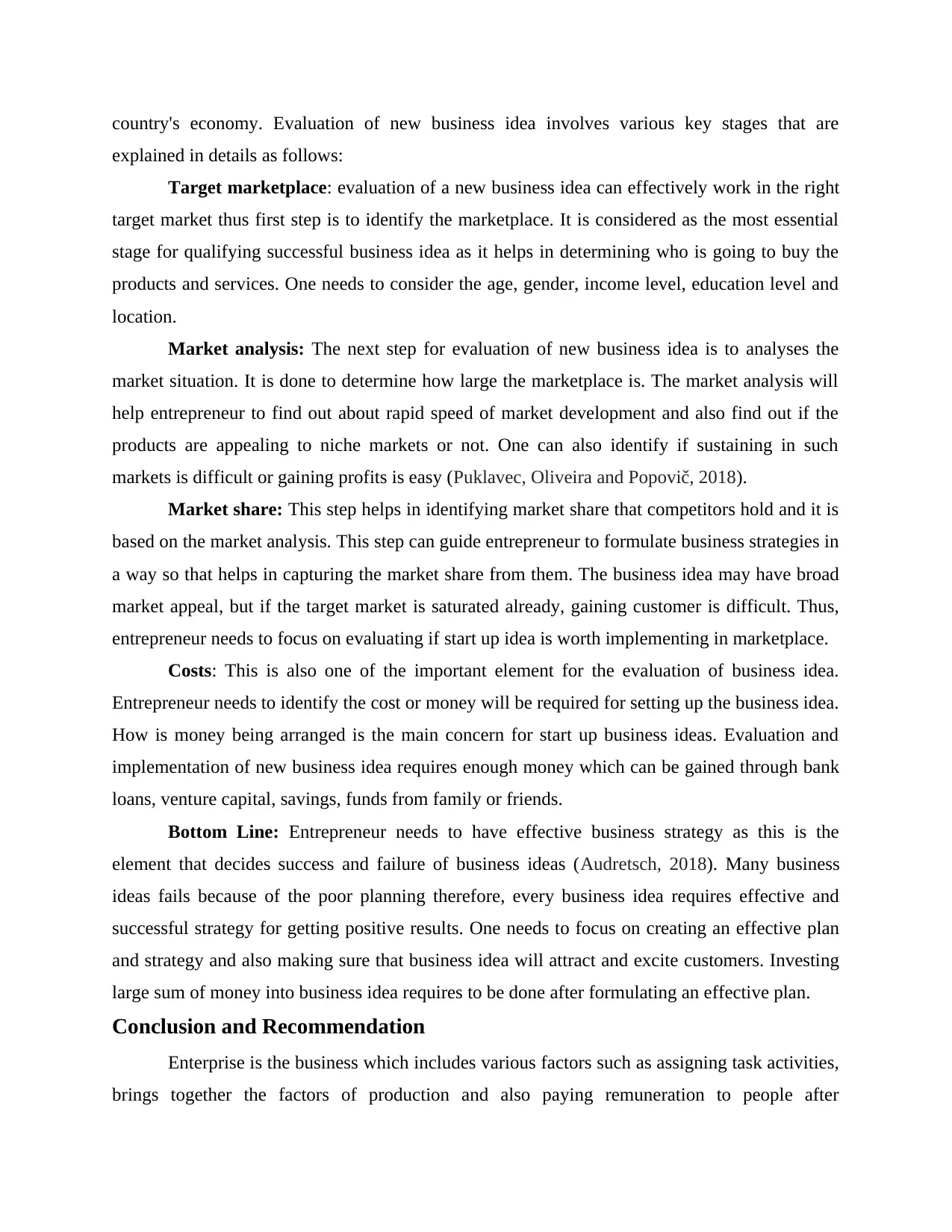
country's economy. Evaluation of new business idea involves various key stages that are
explained in details as follows:
Target marketplace: evaluation of a new business idea can effectively work in the right
target market thus first step is to identify the marketplace. It is considered as the most essential
stage for qualifying successful business idea as it helps in determining who is going to buy the
products and services. One needs to consider the age, gender, income level, education level and
location.
Market analysis: The next step for evaluation of new business idea is to analyses the
market situation. It is done to determine how large the marketplace is. The market analysis will
help entrepreneur to find out about rapid speed of market development and also find out if the
products are appealing to niche markets or not. One can also identify if sustaining in such
markets is difficult or gaining profits is easy (Puklavec, Oliveira and Popovič, 2018).
Market share: This step helps in identifying market share that competitors hold and it is
based on the market analysis. This step can guide entrepreneur to formulate business strategies in
a way so that helps in capturing the market share from them. The business idea may have broad
market appeal, but if the target market is saturated already, gaining customer is difficult. Thus,
entrepreneur needs to focus on evaluating if start up idea is worth implementing in marketplace.
Costs: This is also one of the important element for the evaluation of business idea.
Entrepreneur needs to identify the cost or money will be required for setting up the business idea.
How is money being arranged is the main concern for start up business ideas. Evaluation and
implementation of new business idea requires enough money which can be gained through bank
loans, venture capital, savings, funds from family or friends.
Bottom Line: Entrepreneur needs to have effective business strategy as this is the
element that decides success and failure of business ideas (Audretsch, 2018). Many business
ideas fails because of the poor planning therefore, every business idea requires effective and
successful strategy for getting positive results. One needs to focus on creating an effective plan
and strategy and also making sure that business idea will attract and excite customers. Investing
large sum of money into business idea requires to be done after formulating an effective plan.
Conclusion and Recommendation
Enterprise is the business which includes various factors such as assigning task activities,
brings together the factors of production and also paying remuneration to people after
explained in details as follows:
Target marketplace: evaluation of a new business idea can effectively work in the right
target market thus first step is to identify the marketplace. It is considered as the most essential
stage for qualifying successful business idea as it helps in determining who is going to buy the
products and services. One needs to consider the age, gender, income level, education level and
location.
Market analysis: The next step for evaluation of new business idea is to analyses the
market situation. It is done to determine how large the marketplace is. The market analysis will
help entrepreneur to find out about rapid speed of market development and also find out if the
products are appealing to niche markets or not. One can also identify if sustaining in such
markets is difficult or gaining profits is easy (Puklavec, Oliveira and Popovič, 2018).
Market share: This step helps in identifying market share that competitors hold and it is
based on the market analysis. This step can guide entrepreneur to formulate business strategies in
a way so that helps in capturing the market share from them. The business idea may have broad
market appeal, but if the target market is saturated already, gaining customer is difficult. Thus,
entrepreneur needs to focus on evaluating if start up idea is worth implementing in marketplace.
Costs: This is also one of the important element for the evaluation of business idea.
Entrepreneur needs to identify the cost or money will be required for setting up the business idea.
How is money being arranged is the main concern for start up business ideas. Evaluation and
implementation of new business idea requires enough money which can be gained through bank
loans, venture capital, savings, funds from family or friends.
Bottom Line: Entrepreneur needs to have effective business strategy as this is the
element that decides success and failure of business ideas (Audretsch, 2018). Many business
ideas fails because of the poor planning therefore, every business idea requires effective and
successful strategy for getting positive results. One needs to focus on creating an effective plan
and strategy and also making sure that business idea will attract and excite customers. Investing
large sum of money into business idea requires to be done after formulating an effective plan.
Conclusion and Recommendation
Enterprise is the business which includes various factors such as assigning task activities,
brings together the factors of production and also paying remuneration to people after
Paraphrase This Document
Need a fresh take? Get an instant paraphrase of this document with our AI Paraphraser
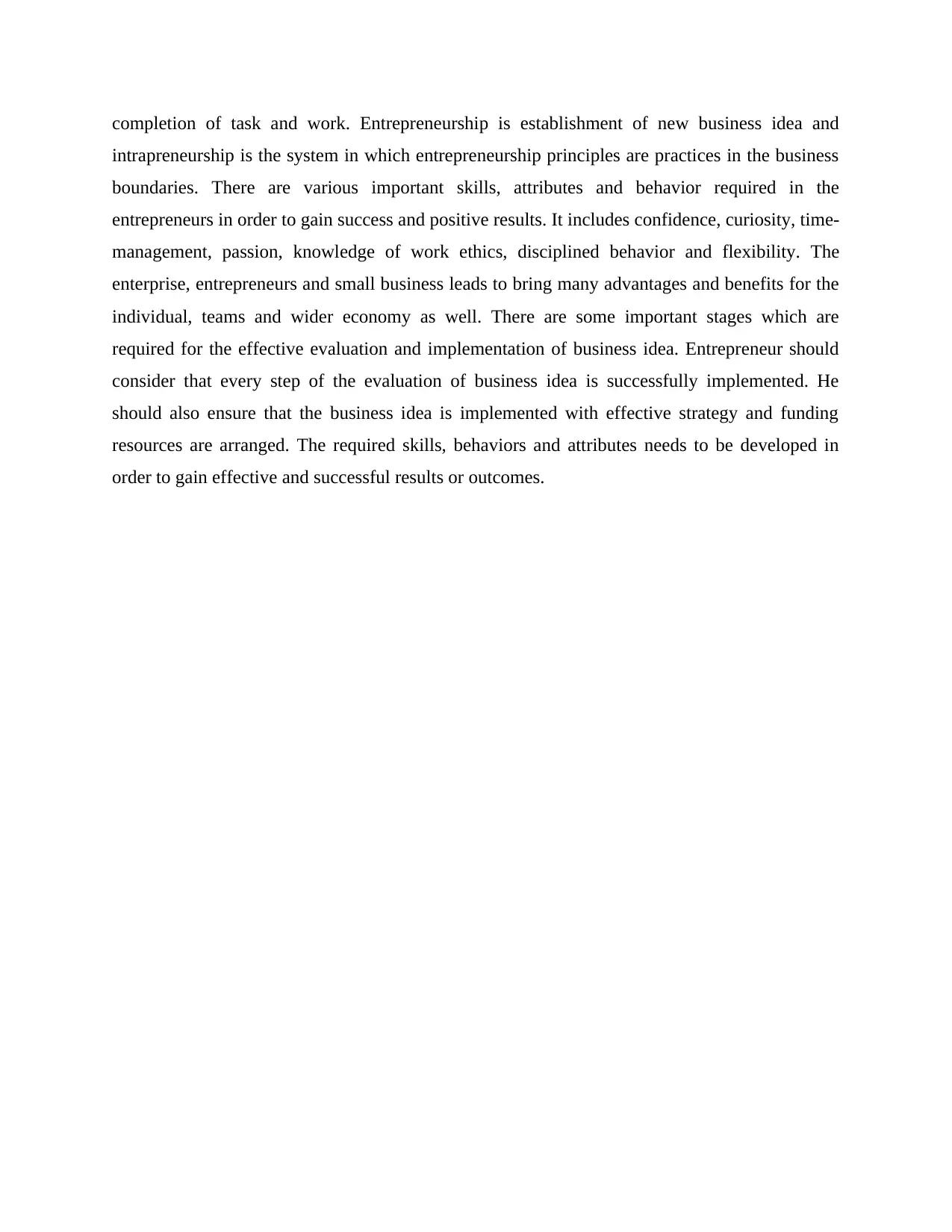
completion of task and work. Entrepreneurship is establishment of new business idea and
intrapreneurship is the system in which entrepreneurship principles are practices in the business
boundaries. There are various important skills, attributes and behavior required in the
entrepreneurs in order to gain success and positive results. It includes confidence, curiosity, time-
management, passion, knowledge of work ethics, disciplined behavior and flexibility. The
enterprise, entrepreneurs and small business leads to bring many advantages and benefits for the
individual, teams and wider economy as well. There are some important stages which are
required for the effective evaluation and implementation of business idea. Entrepreneur should
consider that every step of the evaluation of business idea is successfully implemented. He
should also ensure that the business idea is implemented with effective strategy and funding
resources are arranged. The required skills, behaviors and attributes needs to be developed in
order to gain effective and successful results or outcomes.
intrapreneurship is the system in which entrepreneurship principles are practices in the business
boundaries. There are various important skills, attributes and behavior required in the
entrepreneurs in order to gain success and positive results. It includes confidence, curiosity, time-
management, passion, knowledge of work ethics, disciplined behavior and flexibility. The
enterprise, entrepreneurs and small business leads to bring many advantages and benefits for the
individual, teams and wider economy as well. There are some important stages which are
required for the effective evaluation and implementation of business idea. Entrepreneur should
consider that every step of the evaluation of business idea is successfully implemented. He
should also ensure that the business idea is implemented with effective strategy and funding
resources are arranged. The required skills, behaviors and attributes needs to be developed in
order to gain effective and successful results or outcomes.
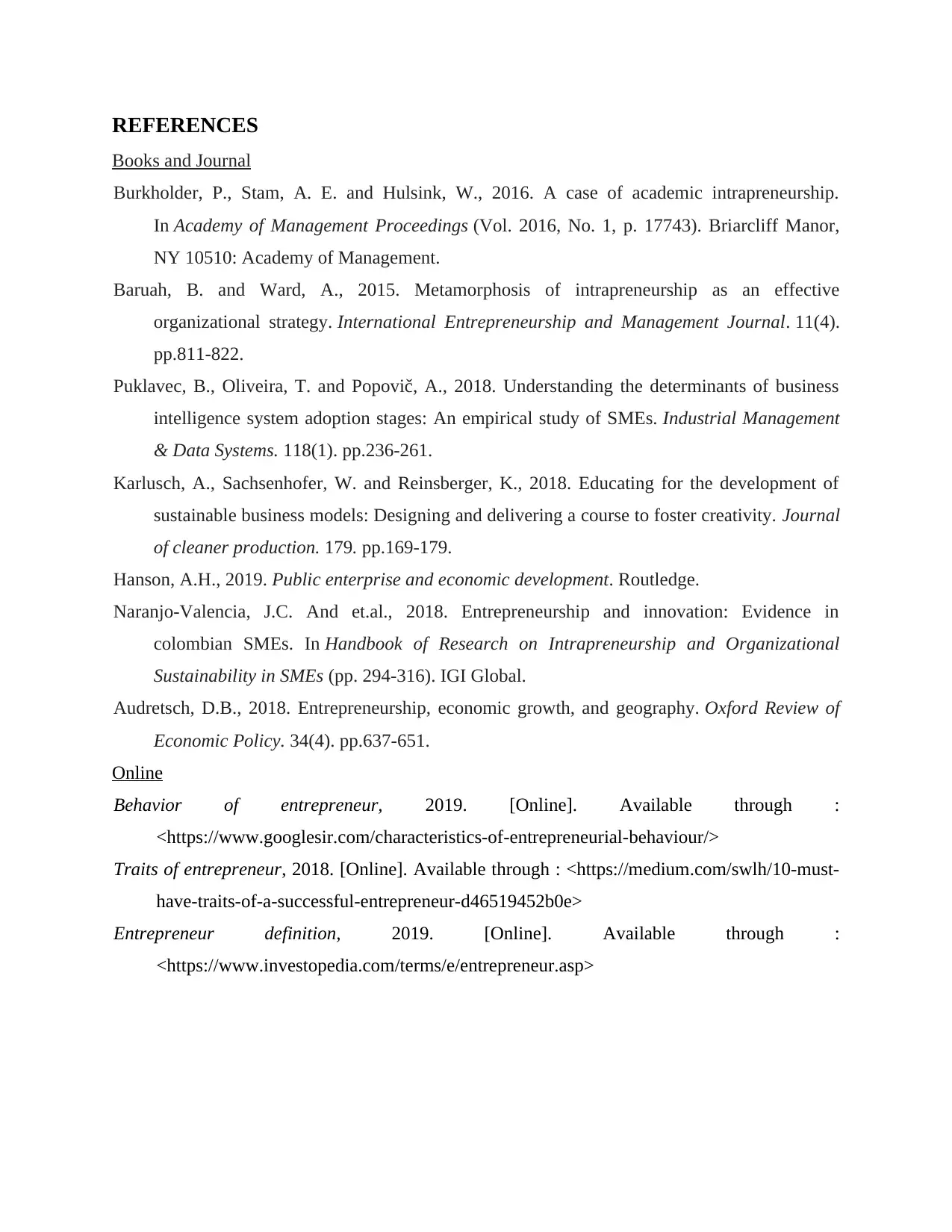
REFERENCES
Books and Journal
Burkholder, P., Stam, A. E. and Hulsink, W., 2016. A case of academic intrapreneurship.
In Academy of Management Proceedings (Vol. 2016, No. 1, p. 17743). Briarcliff Manor,
NY 10510: Academy of Management.
Baruah, B. and Ward, A., 2015. Metamorphosis of intrapreneurship as an effective
organizational strategy. International Entrepreneurship and Management Journal. 11(4).
pp.811-822.
Puklavec, B., Oliveira, T. and Popovič, A., 2018. Understanding the determinants of business
intelligence system adoption stages: An empirical study of SMEs. Industrial Management
& Data Systems. 118(1). pp.236-261.
Karlusch, A., Sachsenhofer, W. and Reinsberger, K., 2018. Educating for the development of
sustainable business models: Designing and delivering a course to foster creativity. Journal
of cleaner production. 179. pp.169-179.
Hanson, A.H., 2019. Public enterprise and economic development. Routledge.
Naranjo-Valencia, J.C. And et.al., 2018. Entrepreneurship and innovation: Evidence in
colombian SMEs. In Handbook of Research on Intrapreneurship and Organizational
Sustainability in SMEs (pp. 294-316). IGI Global.
Audretsch, D.B., 2018. Entrepreneurship, economic growth, and geography. Oxford Review of
Economic Policy. 34(4). pp.637-651.
Online
Behavior of entrepreneur, 2019. [Online]. Available through :
<https://www.googlesir.com/characteristics-of-entrepreneurial-behaviour/>
Traits of entrepreneur, 2018. [Online]. Available through : <https://medium.com/swlh/10-must-
have-traits-of-a-successful-entrepreneur-d46519452b0e>
Entrepreneur definition, 2019. [Online]. Available through :
<https://www.investopedia.com/terms/e/entrepreneur.asp>
Books and Journal
Burkholder, P., Stam, A. E. and Hulsink, W., 2016. A case of academic intrapreneurship.
In Academy of Management Proceedings (Vol. 2016, No. 1, p. 17743). Briarcliff Manor,
NY 10510: Academy of Management.
Baruah, B. and Ward, A., 2015. Metamorphosis of intrapreneurship as an effective
organizational strategy. International Entrepreneurship and Management Journal. 11(4).
pp.811-822.
Puklavec, B., Oliveira, T. and Popovič, A., 2018. Understanding the determinants of business
intelligence system adoption stages: An empirical study of SMEs. Industrial Management
& Data Systems. 118(1). pp.236-261.
Karlusch, A., Sachsenhofer, W. and Reinsberger, K., 2018. Educating for the development of
sustainable business models: Designing and delivering a course to foster creativity. Journal
of cleaner production. 179. pp.169-179.
Hanson, A.H., 2019. Public enterprise and economic development. Routledge.
Naranjo-Valencia, J.C. And et.al., 2018. Entrepreneurship and innovation: Evidence in
colombian SMEs. In Handbook of Research on Intrapreneurship and Organizational
Sustainability in SMEs (pp. 294-316). IGI Global.
Audretsch, D.B., 2018. Entrepreneurship, economic growth, and geography. Oxford Review of
Economic Policy. 34(4). pp.637-651.
Online
Behavior of entrepreneur, 2019. [Online]. Available through :
<https://www.googlesir.com/characteristics-of-entrepreneurial-behaviour/>
Traits of entrepreneur, 2018. [Online]. Available through : <https://medium.com/swlh/10-must-
have-traits-of-a-successful-entrepreneur-d46519452b0e>
Entrepreneur definition, 2019. [Online]. Available through :
<https://www.investopedia.com/terms/e/entrepreneur.asp>
⊘ This is a preview!⊘
Do you want full access?
Subscribe today to unlock all pages.

Trusted by 1+ million students worldwide
1 out of 9
Related Documents
Your All-in-One AI-Powered Toolkit for Academic Success.
+13062052269
info@desklib.com
Available 24*7 on WhatsApp / Email
![[object Object]](/_next/static/media/star-bottom.7253800d.svg)
Unlock your academic potential
Copyright © 2020–2026 A2Z Services. All Rights Reserved. Developed and managed by ZUCOL.





